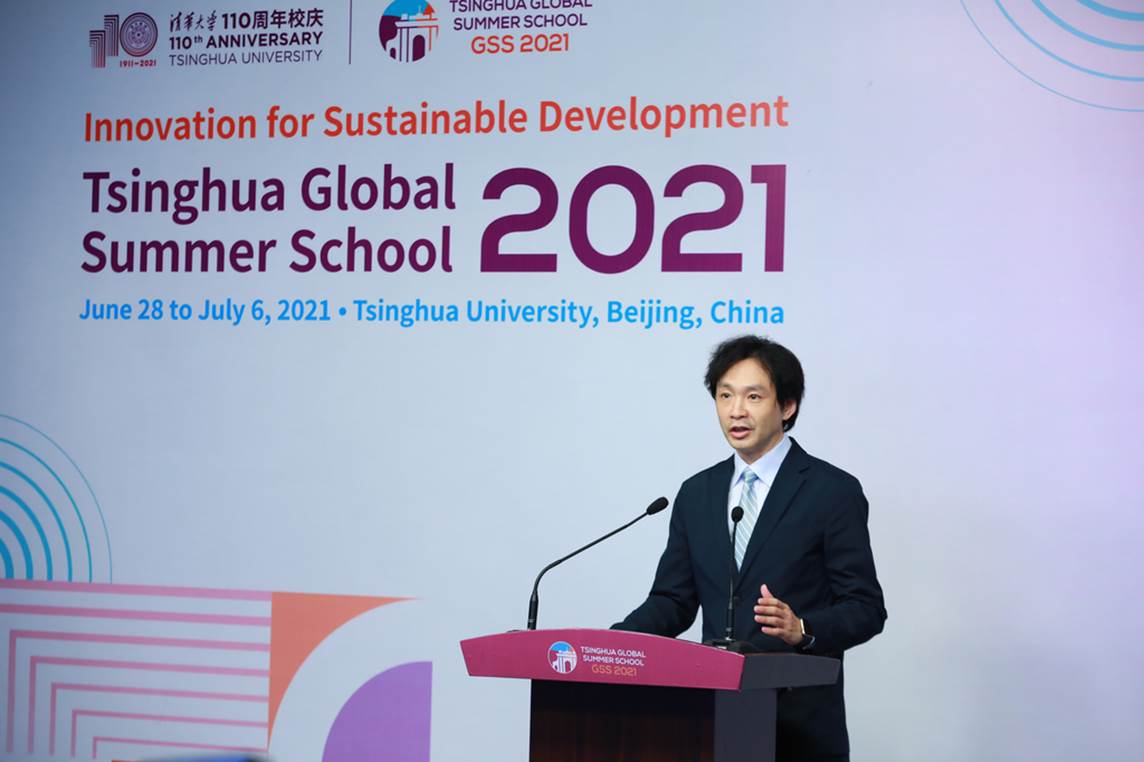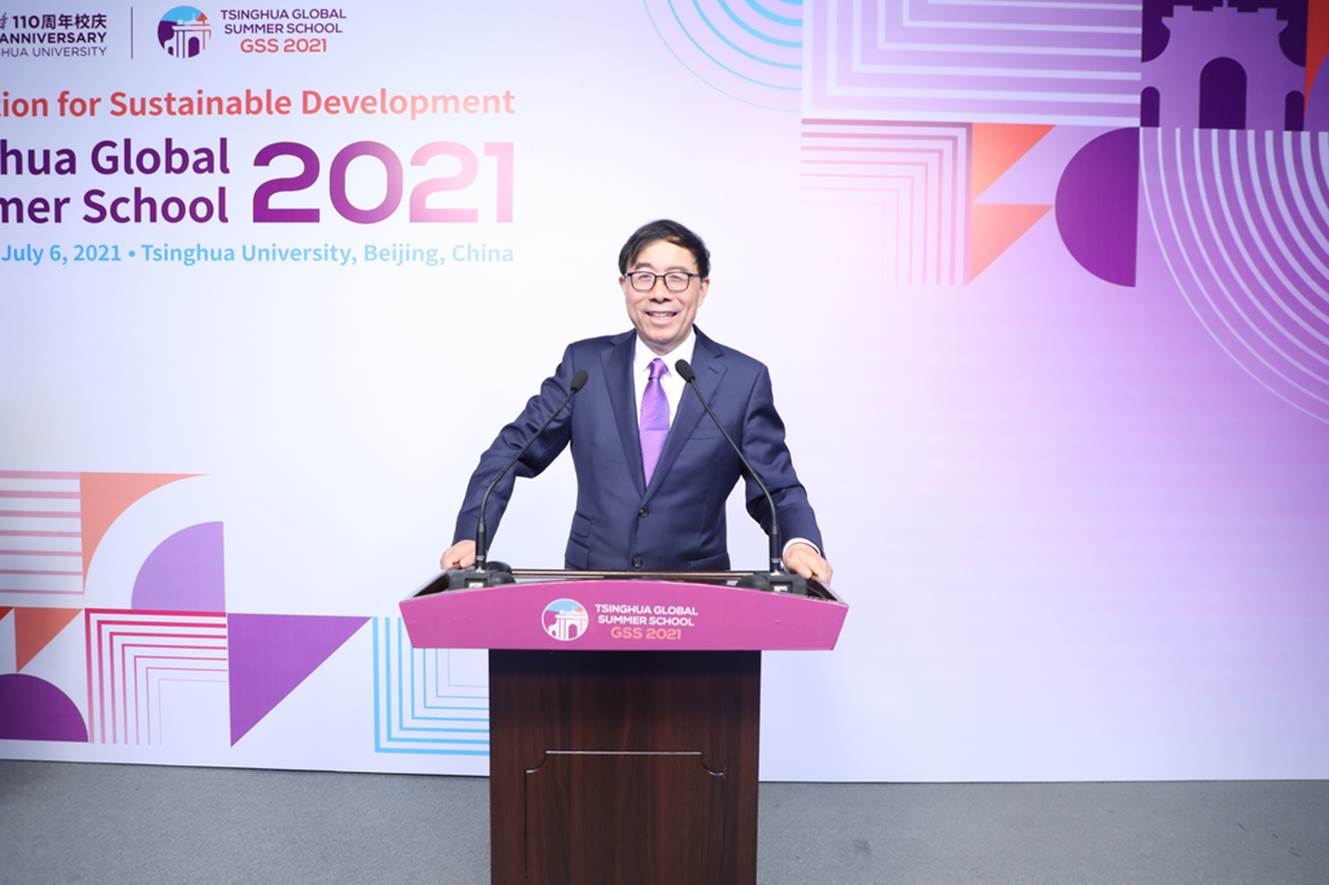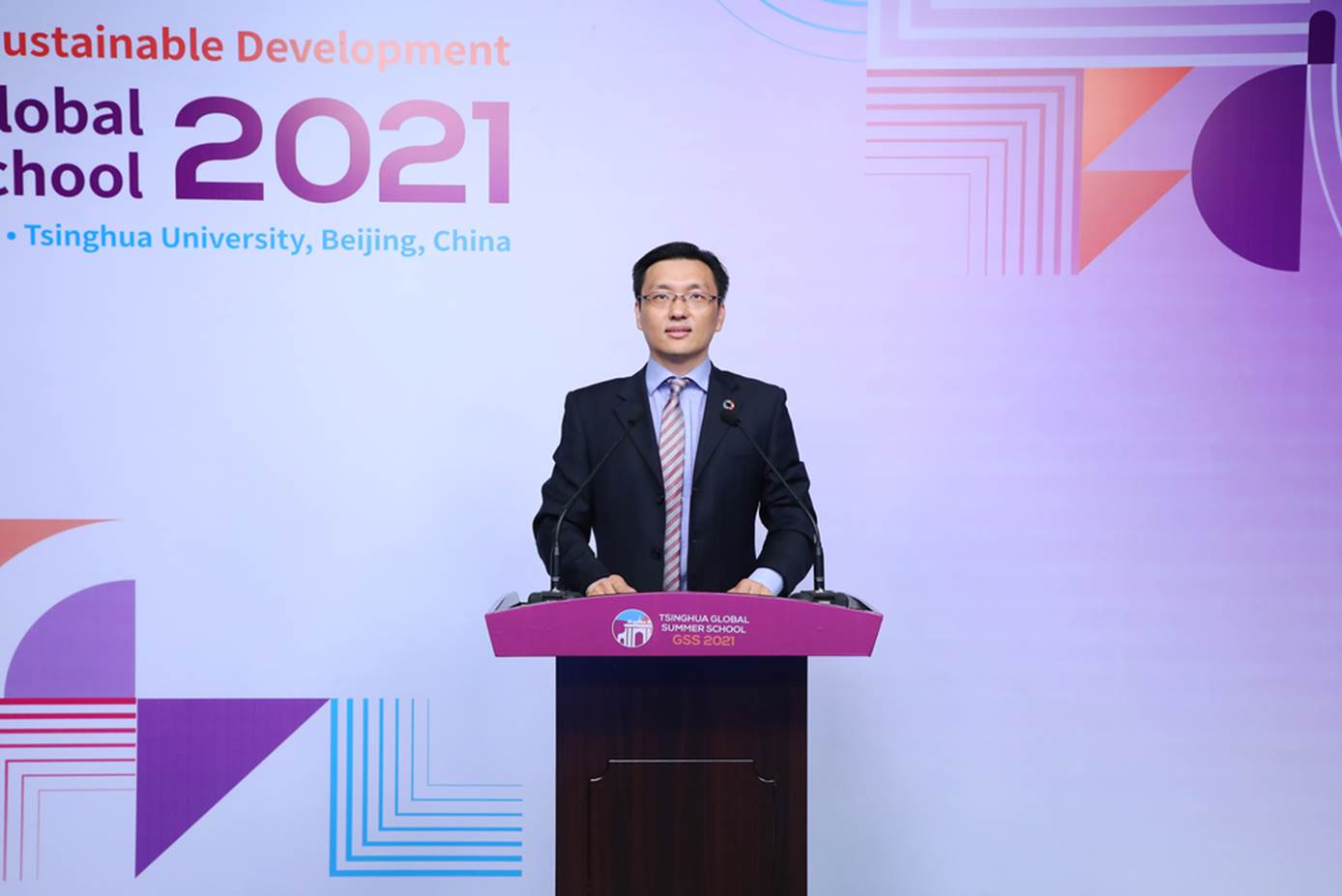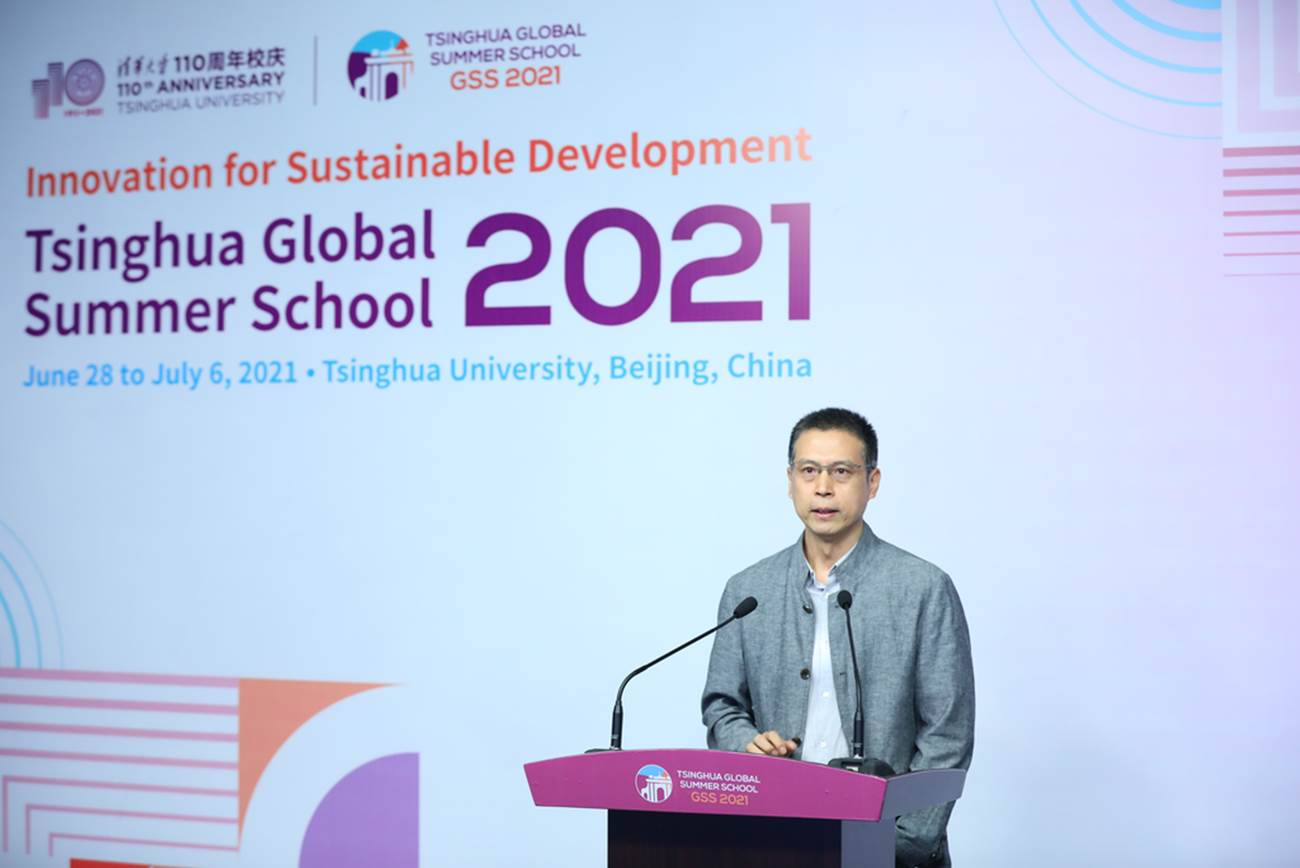On June 28, Tsinghua University’s Global Summer School 2021 (GSS2021) officially kicked off. GSS2021 focuses on enhancing students’ understanding of sustainable development and their innovative thinking. One key component of the Summer School are the Masterclasses, where experts in their fields are invited to share their frontier insights. From June 28 to 30, four separate Masterclasses were delivered, namely by Professor Pei-Luen Patrick Rau from The Global Innovation Exchange (GIX), Professor PENG Kaiping from the School of Social Sciences, Professor ZHU Xufeng from the School of Public Policy and Management, and Professor LIU Xin from the Academy of Arts & Design.
Masterclass 2: Developing Leaders in Innovation

Professor Patrick Pei-Luen Rau delivering the Masterclass
On June 28, Patrick Pei-Luen Rau, Vice Dean of Global Innovation Exchange, Professor of Department of Industrial Engineering at Tsinghua University, delivered his Masterclass, entitled: Developing Leaders in Innovation.
What is effective leadership? Throughout the lecture, Professor Rau explored this question using various examples. In such a fast-developing innovative society, the idea of effective leadership is forever evolving. In order to become a successful leader, future leaders must cultivate additional skills and innovative features to be able to adapt to future challenges. Innovative leaders require more than just professional skills. Innovative leaders should be pioneers who can break through traditional boundaries, join together research, industry and production, and combine technological development, entrepreneurship and design thinking. With a project-based learning practice, innovative leaders are able to solve global challenges while being rooted in their local environment and culture.
Professor Rau further explained the mindset behind innovative leadership by using the graduation projects of Global Innovation Exchange students’ as examples. During the Q&A session, Professor Rau interacted with the audience on questions including “should innovative leaders be the most innovative people on the team?”.
The masterclass was well received by the audience as it helped to broaden their understanding on the often-discussed term of “leadership”, and urged them to think about the kind of “innovative leader” that they would like to become in the future.
Masterclass 3: Positive Psychology for the Post-Pandemic Era

Professor Peng Kaiping delivering the Masterclass
On June 29, Peng Kaiping, Dean of the School of Social Sciencesat Tsinghua University, Professor of Psychology and also the founder of Happiness Technology Lab of Tsinghua University, delivered his Masterclass, entitled: Positive Psychology for the Post-Pandemic Era.
Based on the current social stress caused by the COVID-19 pandemic and the resulting large-scale behavioral changes and significant psychological burdens on individuals, Professor Peng Kaiping believes that insights from positive psychology are critical for optimizing the response to stress. He reviewed different dimensions of positive psychology research and also deconstructed the psychological behavioral processes behind current social issues, for example, the psychological mechanism and coping of the "lying-flat" phenomenon. Professor Peng Kaiping then focused on the personal experience of happiness, and provided some suggestions on how we can all improve our mood and wellbeing. Students from all over the world asked questions about positive psychology, such as how negative emotions can be controlled, what is the nature of helping behavior, whether human thinking is based on past problem-solving, and the relationship between modern technology and wellbeing.
At the end of the Masterclass, Professor Peng Kaiping explained that he feels that humanity is built on unity and togetherness, and it is "altruism" not “selfishness” that is in our genes, and human thought is geared towards the needs of the future. We are actively predicting the likelihood of the future, so we should also actively embrace future technological development. While limiting the negative effects of technologies, we need to develop new technologies that can promote human wellbeing.
Masterclass 4: Tsinghua University and Sustainable Development

Professor Zhu Xufeng delivering the Masterclass
On June 30, Professor Zhu Xufeng, Vice Dean of the School of Public Administration of Tsinghua University and Executive Dean of the Institute of Global Sustainable Development of Tsinghua University, delivered a Masterclass entitled: Tsinghua University and the Sustainable Development Goals.
Professor Zhu Xufeng focused on the UN’ s 17 Sustainable Development Goals, analyzed the current sustainable development process and global challenges, introduced China’s substantive efforts in implementing the Sustainable Development Goals, and discussed the role of universities - particularly Tsinghua - in promoting sustainable development. Professor Zhu Xufeng show cased the remarkable recent achievements of Tsinghua University in contributing Chinese wisdom and strength for global sustainable development from four key aspects: talent training, scientific research, social contribution, and cultural inheritance and innovation.
Specifically, in terms of talent training, Tsing- hua University has opened many diverse courses to deepen the understanding of sustainable development concepts among students. In terms of scientific research, Tsinghua University has established 410 University affiliated research centers related with SDGs, among which there are 107 University-level Think Tanks. In terms of social contribution, the COVID-19 pandemic has prompted countries to pay more attention to health and hygiene. Tsinghua University took the lead in bringing together online and off line courses and social practice projects. In 2020, Tsinghua University established the Vanke School of Public Health as a timely academic response to major global public health issues. In terms of cultural heritage and innovation, the Tsinghua University Art Museum is helping to strengthen the “combining of art and science”.
In Q&A session, Professor Zhu Xufeng shared his views on hot topics such as talent training in SDG-related fields, and gave detailed answers to questions regarding sustainable development career planning, sustainable development academic research, and academic journal recommendations.
Masterclass 5: Sustainable Design and Creative Thinking

Professor Liu Xin delivering the Masterclass
On June 30, the 5th Masterclass of GSS 2021 was held by Professor Liu Xin, entitled: Design for Sustainability and Creative Thinking. Dr. Liu Xin is one of the pioneers and distinguished scholars in sustainability design in China. He is a professor and deputy director of the Industrial Design Department, Academy of Arts & Design, at Tsinghua University. He is also the director of the Tsinghua Eco-Design Research Institute and Tsinghua DESIS Lab, and initiator and coordinator of LeNS-China.
In his Masterclass, Liu Xin advocated for "sustainable design" as a way to tackle local and global sustainable development challenges by creating solutions that are equally beneficial to society, economy, and the natural environment. He discussed the basic principles, methods, and characteristics of sustainable design and of design thinking. He defined design thinking as “engaging in a series of activities to discover, define, and solve a problem”; that is, “how to think and create possible solutions in the context of restraining factors”. He shared the seven principles of design thinking he has learned through many years of research, practice, and education: Human-Centered, Systematic and Integrated Solutions, Cross-disciplinary Collaboration, Visualization, Ecological Inspirations, Prototyping, Innovative Experiments, and Rationality and Intuition.
Liu Xin illustrated sustainable design through several of his research projects that contribute to helping achieve multiple SDG goals at the local level. For example, the “Lettuce House” as a Sustainable Life style Lab, the ecological Public Toilet Project across China, an Integrated Squatting/Sitting Duel-use Toilet and Waterless Disposal System for Rural Areas, the Sunshine School Toilet Project for Rural Children, and the Wave-Power Nearshore Floating Garbage Collection Equipment.
Liu Xin hopes that GSS students can use design-thinking concepts and tools to create their own innovative sustainable design. He believes that “design is not a monopoly of the designer, but for everyone to improve the world in a proactive and creative way”. He advocates the idea of design for sustainable transitions, that is, “there are no best sustainable solutions, just a direction and vision to follow so as to explore and create better sustainable solutions”.